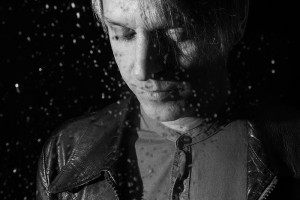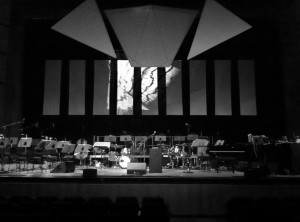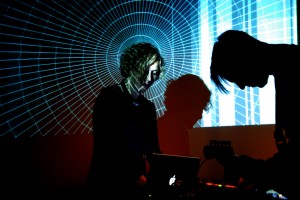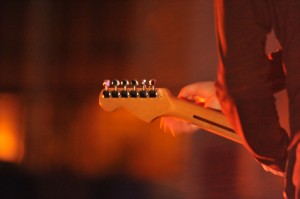Sonic Transmutation: Markus Mehr, the Modular Orchestra and the Chamber Choir of Augsburg University perform ‘Gymnasium/Swarms’
 As one of the shining gems in the Hidden Shoal catalogue, Markus Mehr isn’t just a musician – he’s a sound collector, an arranger, an audio artist, a field recordist and a master of aural assemblage. In June, Mehr performed at the Modular Festival in his home town of Augsburg, Bavaria. But this was no usual Markus Mehr performance. Along with his regular collaborator, video artist Stefanie Sixt, Mehr was joined by the Chamber Choir of Augsburg University, the Modular Orchestra, and conductor Michael Kamm in a performance of ‘Gymnasium/Swarms’ from Binary Rooms. It was the first time Mehr’s music had been given the orchestral treatment, as his inorganic sounds, field recordings and heavily effected synths were rendered acoustic by a cast of dozens of musicians before a crowd of 2,000. Mehr spoke with Matthew Tomich about this highly unusual collaboration.
As one of the shining gems in the Hidden Shoal catalogue, Markus Mehr isn’t just a musician – he’s a sound collector, an arranger, an audio artist, a field recordist and a master of aural assemblage. In June, Mehr performed at the Modular Festival in his home town of Augsburg, Bavaria. But this was no usual Markus Mehr performance. Along with his regular collaborator, video artist Stefanie Sixt, Mehr was joined by the Chamber Choir of Augsburg University, the Modular Orchestra, and conductor Michael Kamm in a performance of ‘Gymnasium/Swarms’ from Binary Rooms. It was the first time Mehr’s music had been given the orchestral treatment, as his inorganic sounds, field recordings and heavily effected synths were rendered acoustic by a cast of dozens of musicians before a crowd of 2,000. Mehr spoke with Matthew Tomich about this highly unusual collaboration.
MT: How did this performance of ‘Gymnasium/Swarms’ come about?
MM: Back in 2008, I was working for Modular Festival in Augsburg. I was hired as a creative director or ideas person, or something like that, and my job was to create ideas and collect ideas from other people and bring in projects and art across all kinds of disciplines – not just music. All the projects lead to this new festival and we thought it would be great to connect the local music scene with the classical music scene, the pop music scene with the classical music scene. This is not new, but unless you’re Metallica, it’s impossible, as a local musician or as a starter, to play with an orchestra, so I thought it would be a great idea. And it needn’t be that typical Night of the Proms thing – do you have this in Australia, do you know what I mean?
MT: No, I’m not sure what you mean.
 MM: We have this in Europe and it’s very successful, where a bunch of aged stars from the ’80s sing their songs with a musical accompaniment embedded in an orchestral context. They fill stadiums here with this boring shit. We didn’t want this project to be like that – the songs from the bands should be cut into pieces and put together in a completely new way. It should be very unusual and new. The difficult thing was to find local conductors and writers who can deliver that, but it was successful. I had two guys at the time, both of whom had one foot in the pop context and the other in the classical context, and one of them – Michael Kamm – was also the arranger of ‘Gymnasium/Swarms’. We started out in 2008 with this and called it ‘Puppet on a String’. And it was successful – very successful – and the ‘Puppet on a String’ project is still the opener of the Modular Festival. It’s become bigger and bigger over the years, and we played this year in front of 2,000 people – so that’s a great thing. The end of the story is that I only worked for them for two years, then I left it, and this year they asked me to play with them – as a kind of homage if you like, or because they love the album, I don’t know! And I thought it was a cool idea from the beginning, because it was my idea [laughs]! So it was a unique opportunity to do this stuff, and it’s obviously a fantastic thing to stand in front of a choir of 40 people and to stand in front of this orchestra – it sounds beautiful. So that’s the whole story. I invented this event because it was my job somehow, and I saw it growing, and this year they asked me, and I said yes.
MM: We have this in Europe and it’s very successful, where a bunch of aged stars from the ’80s sing their songs with a musical accompaniment embedded in an orchestral context. They fill stadiums here with this boring shit. We didn’t want this project to be like that – the songs from the bands should be cut into pieces and put together in a completely new way. It should be very unusual and new. The difficult thing was to find local conductors and writers who can deliver that, but it was successful. I had two guys at the time, both of whom had one foot in the pop context and the other in the classical context, and one of them – Michael Kamm – was also the arranger of ‘Gymnasium/Swarms’. We started out in 2008 with this and called it ‘Puppet on a String’. And it was successful – very successful – and the ‘Puppet on a String’ project is still the opener of the Modular Festival. It’s become bigger and bigger over the years, and we played this year in front of 2,000 people – so that’s a great thing. The end of the story is that I only worked for them for two years, then I left it, and this year they asked me to play with them – as a kind of homage if you like, or because they love the album, I don’t know! And I thought it was a cool idea from the beginning, because it was my idea [laughs]! So it was a unique opportunity to do this stuff, and it’s obviously a fantastic thing to stand in front of a choir of 40 people and to stand in front of this orchestra – it sounds beautiful. So that’s the whole story. I invented this event because it was my job somehow, and I saw it growing, and this year they asked me, and I said yes.
MT: You mentioned that these arrangers and composers had one foot in pop music and one foot in classical music, but you’re neither of those things – you’re electronic music. Was that a weird area for them to negotiate?
MM: I guess that was one of the reasons why they asked me – the challenge – and why I asked Michael Kamm to be my conductor. I think it was kind of a challenge for him as well, to write for a guy like me who’s doing strange stuff and is far out of a pop context or a song context. I guess that’s exactly what the approach was – to bring a guy that sounds like me into the project, because the other nine artists this year were singers with songs. They were heavy metal, they were songwriters – acoustic songs and stuff like that – so I was an exotic guy anyway in this whole context, and I guess they wanted to show another side of this ‘Puppet on a String’ project. I want to say: yes, it was kind of a challenge for everyone, and they wanted to bring some electronic and avant-garde kind of thing into this project.
MT: Was it a challenge for you as well? Because most of your work performed under your name is performed solo or in collaboration with Stefanie Sixt, who does your visuals. Was it strange to relinquish control of your music in that live setting to someone else?
 MM: It was one of the biggest things I can imagine. I was honoured and I was completely nervous about it. At the beginning I had all these questions – how can we do it? How will it turn out? Is this crap? Is it possible to do it? In a good way, I didn’t know. But from the very beginning my choice was to work together with Michael – the first guy that I’ve ever asked to do something for ‘Puppet on a String’, and also a friend of mine, so I was very close to him anyway. I knew he was a good guy and I knew he would give it the right treatment. We had a nice conversation the whole time. He was here in my studio and we had a look at the arrangement and he had the imagination for what he could do in an orchestra – this can be a part for a choir, what can you do there? – so we had a dialogue. And he had a plan right before he was starting to write down the score. We knew theoretically what each musician would do, what would be the part of the orchestra, what would be the part for me. But it was a big challenge for the orchestra as well, and for the choir, until we brought them all together on one stage. If you look at the video, you’ll see that the choir starts out with the paper thing, they do a kind of scrunching noise, so they don’t sing until minute three or four. They have to do funny things with their feet and stuff like that. So for the whole performance, the plan was to go along with this John Cage approach. My music doesn’t have measures or beats per minute.
MM: It was one of the biggest things I can imagine. I was honoured and I was completely nervous about it. At the beginning I had all these questions – how can we do it? How will it turn out? Is this crap? Is it possible to do it? In a good way, I didn’t know. But from the very beginning my choice was to work together with Michael – the first guy that I’ve ever asked to do something for ‘Puppet on a String’, and also a friend of mine, so I was very close to him anyway. I knew he was a good guy and I knew he would give it the right treatment. We had a nice conversation the whole time. He was here in my studio and we had a look at the arrangement and he had the imagination for what he could do in an orchestra – this can be a part for a choir, what can you do there? – so we had a dialogue. And he had a plan right before he was starting to write down the score. We knew theoretically what each musician would do, what would be the part of the orchestra, what would be the part for me. But it was a big challenge for the orchestra as well, and for the choir, until we brought them all together on one stage. If you look at the video, you’ll see that the choir starts out with the paper thing, they do a kind of scrunching noise, so they don’t sing until minute three or four. They have to do funny things with their feet and stuff like that. So for the whole performance, the plan was to go along with this John Cage approach. My music doesn’t have measures or beats per minute.
MT: There’s no rhythm, right?
MM: Yeah, nothing at all. And one of Michael’s great ideas was to play with clocks – no conducting. Everybody was looking at clocks. You see at the beginning these great clocks on the screen, and everybody was looking – OK, this is 1:20, now it’s my part to do this. It’s a very John Cage-y thing. It’s not possible to conduct fragments like that. It was a timetable and that’s the magic touch.
MT: Did you have much interaction with the rest of the orchestra and the choir, or was that all done through Michael?
MM: I was there for two rehearsals and I knew what they’d do, and after that, I had a conversation with Michael – oh, I don’t like this, what do you think of this – so we discussed a few things, but most of the time, Michael was the leader and communicated with all the musicians. It was very quick – we only had one rehearsal with the orchestra, the day before we performed – and I had two rehearsals with the choir, but I had nothing to do; I was just a listener. So it came together very quickly and Michael was the communicator. And on stage as well – everybody knew what to do when the time was there, so we didn’t have to look at Michael as a conductor, but you see him conducting the choir – louder, louder, stay – you see what he did with his hands. So they looked at him and he was the medium, and I had my timetable and did my thing like the other people on stage as well. I looked at the clock and played my parts when I had to.
Markus Mehr – Gymnasium/Swarms (Live with Orchestra) from Hidden Shoal on Vimeo.
MT: Last time we spoke, you talked about the duality of your work and the relationship between warm and cold, and organic and inorganic. When your samples are rendered live by an orchestra and electronic music becomes acoustic, or when the choir starts bursting into chatter to mimic the sample you have, is that the ultimate realisation of what you’re trying to do with opposites?
MM: Yes, I would say so. But it’s unusual – you spend so much time trying to find new sounds or to tweak sounds to make them sound new or different or inorganic or strange, and often the sounds came from natural instruments. You tweak knobs and then it doesn’t sound like a trumpet. And all of a sudden you stand on stage with someone playing a trombone, and he’s playing the sound again like an elephant – that’s strange. It’s the opposite of what you tend to do. It comes full circle. Believe me, it’s so strange. But it’s so much fun – I guess if we were to have this conversation five or six years ago, maybe I wouldn’t feel so comfortable with it because my direction was to move away from anything like music. That’s still the direction. But I think it has a sense of humour, or it’s more relaxed, to put it back together in wood and instruments and hear my music in a classical context. Sound-wise, it’s so impressive, if you stand on stage with an orchestra, and I’d never done that. That alone is a wonderful experience – I wouldn’t want to miss that. And everybody involved was so kind and so friendly and so ambitious to do this right for me. I have to point out that nobody in the choir knew me. Some of the musicians on stage knew me from previous projects, but everybody was so keen to make the best of the track, and what Michael did with the arrangement was a blast.
MT: Are there any plans to do something like that again? You mentioned you were collaborating with Michael on something else.
MM: A few days after, Michael and I sat in my kitchen, and we were very ambitious about putting it together again. We had some plans to do the whole album like that, but to be honest, this is not possible. You can’t put together an orchestra, you can’t hold together this choir – it takes too much time and money. And also for Michael as a conductor and as a writer – it took a few days for him to score it. It would be a dream, but I don’t think it will happen again. So, to be honest, I think this was it.
MT: What else are you working on right now? What’s coming up in the future for you?
 MM: At the moment, I’m working on a few things. When we finish this interview, I’ll go back to work on the next couple of albums. I’m working on the last two tracks for the next album, and that’s pencilled in for release in March. So I want to finish that, hopefully this week or next week. After that I’m working on another album – a new project called Low Delayer with my dear friend, Tom Hessler. It’s not completely different to my sound, but it’s quite different. I’d say we are swimming in the pool of post-techno. We’re working with modular synthesizers and my field recordings, bringing both worlds together and doing something that’s not really connected to techno in a pure form, but it has a kind of dance-y feeling. We only play with sounds and make rhythm-like things with sounds recorded from lights, light bulbs, display boards, etc. No drums. Hidden Shoal will release a remix EP from my current album in October, which I’m putting together at the moment. Along with that I’m doing some live performances on my own, and in October, Stefanie and I will play some shows with our new performance, Re-Directed, in Germany and Sweden. So, that’s happening in the coming weeks.
MM: At the moment, I’m working on a few things. When we finish this interview, I’ll go back to work on the next couple of albums. I’m working on the last two tracks for the next album, and that’s pencilled in for release in March. So I want to finish that, hopefully this week or next week. After that I’m working on another album – a new project called Low Delayer with my dear friend, Tom Hessler. It’s not completely different to my sound, but it’s quite different. I’d say we are swimming in the pool of post-techno. We’re working with modular synthesizers and my field recordings, bringing both worlds together and doing something that’s not really connected to techno in a pure form, but it has a kind of dance-y feeling. We only play with sounds and make rhythm-like things with sounds recorded from lights, light bulbs, display boards, etc. No drums. Hidden Shoal will release a remix EP from my current album in October, which I’m putting together at the moment. Along with that I’m doing some live performances on my own, and in October, Stefanie and I will play some shows with our new performance, Re-Directed, in Germany and Sweden. So, that’s happening in the coming weeks.
MT: And is Low Delayer something you’re going to do with Hidden Shoal, or something you want to do with another label?
MM: We want to finish the whole project first. I was in Berlin last week and we did three tracks, very rough. That was a three-day session and we picked three pieces from what we did, so now we can see the material clearly. We will have at least 40 minutes of music, and when it’s finished we will think about what we want to do with it. There are no other plans, but there are definitely plans to release it, that’s for sure. I’m not a guy who lets things get stale on my hard disk. I want to release it. Cam at Hidden Shoal will be one of the first to hear it.
MT: And as for the new album under your name, what can you tell us about that? How’s it sounding, how’s it different?
MM: Well, I’ve finished two different pieces. Re-Directed is one, and a second one, called Dyschronia, is finished as well. To be honest, I’m not sure which one I want to release first. That’s a luxury! Re-Directed deals with the abuse of power in connection with modern technology and communication devices. For this project I recorded tons of sound from servers, hard disks, mobile phones and stuff like that. It’s interesting how different they all sound, by the way. On Dyschronia I’ve experimented with a very different workflow. I’ve been working on that material for more than four years now. It’s about breaks in time, about leaving things alone and coming back, leaving them alone again and coming back again. It’s about sticking with things, looking at them in different ways and from new perspectives in order to observe how things – in this case, sounds – change over time. Time is a luxury in the modern world we live in. I know, musically this says nothing – you’ll have to listen to it when it’s released.